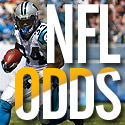To be or not to be (patient)
07/02/2003
Codding Home / Sports Channel / Bullz-Eye Home
They say that patience is a virtue.
Who's "they," you ask? Axel Rose, for one. "Just a little patience, yeah." Still a great tune.
But of all the sayings, proverbs, clichés and adages that have seeped into our everyday language, "patience is a virtue" may harbor the most truth. Let's face it, to succeed in life -- and sometimes to stay out of prison -- you undoubtedly need "just a little patience." Patience with your co-workers when all you really want to do is start knocking heads and then hand in your resignation. Patience with that a-hole in the Honda who just cut you off. Patience with your idiot friends who often do you more harm than good. Patience with your wife and, even more important, her patience with her knucklehead husband. Patience with your kids, as I've learned the past four months.
Of course, patience truly is a virtue in the world of sports. A patient running back waits for his linemen to open up holes and then blasts through them for positive yards. A patient hitter works the count in his favor until he gets a pitch he can drive. A patient point guard sets up the offense and finds open teammates for easy buckets. A patient golfer approaches each round one shot at a time.
Clearly, patience pays off on the field of play. As sports fans, though, we've historically proven that we simply cannot display the level of patience embodied by many of the athletes we root for. We pull out that dreaded "BUST" card if a highly touted rookie struggles in his first couple pro games. We ride any expensive free agent acquisition who fails to live up to our soaring expectations from day one. We despise the term "rebuilding process" and refuse to acknowledge future potential if it doesn't immediately translate into positive results. We call for the head of a coach or manager who can't lead our team to the playoffs.
Bottom line, we want to win and we want to win now. Don't spoon feed us words like upside and promise when defeats outnumber victories. Don't talk about a "bright future" when the present is as dark as Robbie Alomar's days in New York.
And because an unhappy fan more often than not is an apathetic fan, owners and general managers frequently catch our impatience like the flu, making hasty personnel decisions based on negative fan reaction or their own growing aggravation.
But remember, patience is what? That's right, a virtue. Sports fans are rarely virtuous, though, and the same can be said for many of the execs running our teams.
Case in point, the Cleveland Indians are currently in the midst of their own rebuilding process, shedding the contracts of veterans like Roberto Alomar and Bartolo Colon a year ago in hopes of both retooling the team for another World Series run and restocking the farm system with some much needed prospects. Gone along with Robbie and Colon are Manny Ramirez, Juan Gonzalez, Kenny Lofton, Chuck Finley, Robbie's brother Sandy and, of course, Jim Thome.
In their places are youngsters like Brandon Phillips, Ricardo Rodriguez, Jody Gerut, Coco Crisp, Milton Bradley, Billy Traber, Victor Martinez and Ben Broussard.
On the surface, the conversion has been painful at best, a failure at worst.
Yet, a closer look reveals more than your typical impatient fan would ever care to recognize. Phillips, struggling overall at the plate, has been exceptional in the field while also delivering a few key hits. After a hot start (2-2, 3.32 ERA in April), Rodriguez has been extremely hittable of late but still remains a promising (there's that word) fixture in the Tribe's future plans. Gerut's come out of nowhere to rank fourth on the team in total bases, third in RBI, and second in homers and doubles while making one exceptional play after another in right field. Crisp is a speedster who needs to refine his skills but still projects as a flashy leadoff hitter. Bradley, this year's likely All Star representative for the Indians, is currently hitting .341, good for third in the American League, and his .960 OPS (on-base percentage + slugging percentage) ranks seventh in the AL ahead of guys like Nomar Garciaparra, Jason Giambi, Alex Rodriguez and, ironically, Juan Gonzalez. Even better, Bradley hits .485 against left-handing pitching, one of the highest marks in baseball off southpaws, and he's reached base in 65 of the 67 games he's played in this year. Speaking of lefties, Traber, acquired along with minor leaguer Alex Escobar in the Alomar trade with the Mets last year, has been solid this season with a 3.98 ERA in 21 appearances (six starts), pitching seven innings of five-hit ball against the Reds in his last start while striking out five and allowing no earned runs to pick up his third career victory. Martinez, recently called up from Triple-A Buffalo, is the best catching prospect in baseball while Broussard, acquired from the Reds in a trade for human windmill and longtime disappointment Russell Branyan last year, flashes 30-homer potential (there's that word again).
But check the standings and you'll see the Indians, 34-48 despite playing in the worst division in baseball, are 9.5 games behind the Royals, nine behind Minnesota and 6.5 behind the White Sox, who themselves are currently sitting a game below .500.
Which, of course, has C-Town up in arms. Fresh off a playoff appearance from the Browns, Tribe fans can't stand the losing. General manager Mark Shapiro is an idiot, they say. The so-called prospects he traded for last season are flops, they claim. This team was better off under John Hart, they insist.
Never mind that this is Year One of this rebuilding process. And never mind that Year Two, with guys like Bradley and C.C. Sabathia and Martinez and minor league pitcher Jeremy Guthrie leading the charge, could realistically yield a .500 record. And never mind that, while teams like the Tigers, Orioles and Pirates have been trying to rebuild for the better part of a decade, the Indians are poised to contend again by 2005, a mere two full years after holding their own fire sale.
We want to win, and we want to win now.
It's that kind of attitude that will greet the most scrutinized rookie in the history of professional sports, LeBron James.
Let's face it, this kid has absolutely no chance of actually living up to his advanced billing, not this year and probably not next season either. Not only would he have to score at least 25 a night with five boards and five assists as a rookie to validate his hype in the eyes of fans and the media, he'd have to do it all while leading the Cleveland Cavaliers back to the playoffs and finding a cure for cancer.
With the former perhaps being a much more difficult task than the latter.
When he falls short of those standards -- and quite honestly, who wouldn't -- he'll be called a flop and a bust. He'll hear the "o-ver-rated!" chants in every arena he visits. He'll be heckled, he'll be booed, he'll be ridiculed. His failures will be immortalized and his successes forgotten, all because we won't have the patience to allow him to develop and improve.
Because we want to win, and we want to win now.
It's funny, fans in Portland had similar thoughts and feelings regarding Jermaine O'Neal. Drafted with the 17th overall pick in the 1996 draft by the Blazers out of high school, O'Neal started a total of 18 games in four seasons with Portland, averaging 3.9 points and 3.1 rebounds a game during that span.
Then, under direct heat from impatient fans and a brewing postseason rivalry with the Lakers, Portland traded the then 21-year-old O'Neal to the Indiana Pacers prior to the 2000 season for 31-year-old Dale Davis, excited to add both size and experience to the roster.
Since that trade? Davis has hit for 8.0 points per game while pulling down 7.8 boards a night for the Blazers. O'Neal, meanwhile, has blossomed into one of the premier power forwards in the league, averaging 17.4 points, 10.2 rebounds and 2.48 blocks per game in three seasons with Indiana, including 20.8/10.3/2.3 last year. This summer, O'Neal is the second most sought after free agent around, and deservedly so, getting calls from the Jazz, Nuggets and champion Spurs along with the Pacers.
I'm willing to bet the Blazers wouldn't object to having him on their roster either.
The treatment O'Neal received from Portland in his first few NBA seasons mirrors the abuse fellow high schooler Kwame Brown, drafted first overall by the Wizards two years ago, has been subjected to. Blamed for Washington's problems last year and constantly included in countless trade rumors, it looks like the impatient Wizards will eventually give up on Brown after two unproductive seasons, severing ties with perhaps the most palpable reminder of the abandoned Michael Jordan era.
And like the Blazers with O'Neal, it likely will be a move Washington will come to regret.
Of course, these aren't isolated incidents, not by a long shot. The Atlanta Falcons traded the seemingly untamable Brett Favre to the Green Bay Packers in 1992 for a first-round draft pick that netted the Falcons some guy named Tony Smith. The Tampa Bay Devil Rays traded promising but unproductive outfielder Bobby Abreu, originally acquired in the expansion draft after the Astros left him unprotected, to the Phillies for shortstop Kevin Stocker in 1997.
Ouch.
So while coaches in all sports preach patience, the paying customers in the stands aren't always so tolerant. Many times, the people in the front office aren't either. GMs and managers are publicly chastised and often fired if their teams don't deliver. Players are benched, traded and even cut if their numbers aren't up to snuff.
Sometimes, of course, these decisions are justified -- I mean, how long can you keep a kid based solely on his untapped potential; how long can you wait for a GM to finally plug the holes in the hull of a sinking franchise? Ironically, some of the worst moves in professional sports history are the moves that weren't made, like the Chargers refusing to cut Ryan Leaf for three years and the Mets' insistence on keeping GM Steve Phillips around despite his team's complete meltdown.
There's a fine line between giving up on somebody prematurely and giving that same somebody too many chances. Because of varying factors, the most prominent being that green stuff that's reportedly the root of all evil, most fans and team execs prefer to err on the premature side of that line, jumping ship before too much damage can be done.
After all, patience may be a virtue but sometimes, it takes too much damn time and effort to be patient. Just ask the Portland Trail Blazers.
Questions/comments? Send
all e-mails to jcodding@bullz-eye.com.






